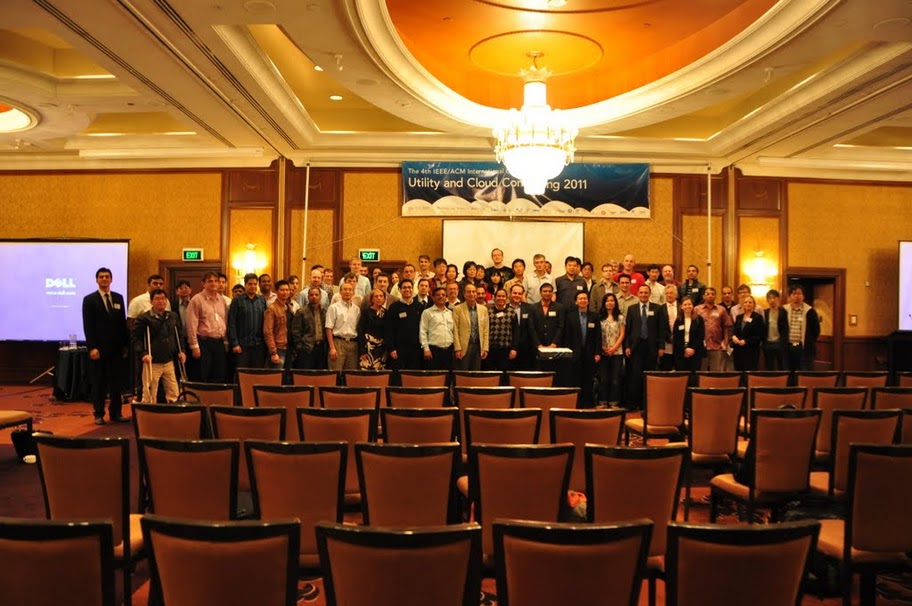|
|
| UCC 2011 photos available on Picasa Web
|
(Click on the picture to access the album)

|
| Best paper awards results |
Check statement from chairs, results, and pictures here.
|
| Welcome from General Chairs |
| UCC2011GenChairMsg.pdf |
| Conference Program |
| A4 version |
Booklet version (print both sides, landscape orientation) |
1:Turning Ideas Into Results: Practical Use Of AWS – Amazon Web Services
Simon Elisha, Principal Solution Architect, Amazon Web Services
|
2:Scaling Web Applications using Google App Engine
Brian Quinlan, Software Engineer, Google
|
|
|
|

|
Professor Manish Parashar
Rutgers: The State University of New Jersey, USA
http://nsfcac.rutgers.edu/people/parashar/
|
Cloud computing has emerged as a dominant paradigm that has been widely adopted by enterprises. Clouds provide on-demand access to computing utilities, an abstraction of unlimited computing resources, and support for on-demand scale up, scale down and scale out. Clouds are also rapidly joining high-performance computing system, clusters and Grids as viable platforms for scientific exploration and discovery. As a result, understanding application formulations and usage modes that are meaningful in such a hybrid infrastructure, and how application workflows can effectively utilize it, is critical. In this talk, I will l explore the role of clouds in science and engineering. I will more ...
|
|
|

|
Professor Albert Zomaya
The University of Sydney, Australia
http://sydney.edu.au/engineering/it/~zomaya/
|
Global warming and climate change trends call for urgent action to manage information and communication technologies in a sustainable manner by minimizing energy consumption and utilizing resources more efficiently. Distributed computing environments (clusters, grids, clouds, etc) have become the de facto platforms for many applications. These systems bring a range of heterogeneous resources that should be able to function continuously and autonomously. However, distributed systems expend a lot of energy which raises a range of important research issues related to the use and virtualisation of ICT resources in a way offers significant potential to contribute to the goal of what has been described as ‘green computing’. This talk will review more ...
|
|
|

|
Dr. Wolfgang Gentzsch
DEISA (Distributed European Initiative for Supercomputing Applications), Germany
http://www.hpcc-usa.org/Bios/gentzschbio10.htm
|
There is a lot of good activity and visibility of HPC in the Cloud, in our
community, and cloud service providers publish interesting (theoretical)
case studies on cloud infrastructures and technologies and how to use
them. Also, in mainstream IT services, there are many good use cases for
describing how to use clouds for daily business. However, in the emerging
field of 'mainstream HPC' (or should we rather say Technical Computing),
there are still so far only very few success stories published about
applying cloud infrastructure and technology in daily research and
industry. Therefore, in our talk, we will contribute an overview on
selected and highly actual real use cases from HPC in the Cloud and
present a short analysis of each of them. Finally, we will conclude with a
trend analysis, and a list of lessons learned and recommendations.
|
|
|

|
Geng Lin
Chief Technology Officer
Networking Business, Dell Inc.
|
Cloud computing brings profound impact to virtually all segments in the IT industry, ranging from computing, storage, networking, to software applications. Yet the field of cloud computing is still in early stage - industry leaders and academia researchers are expanding this field rapidly. This talk focuses on the emerging network architectures for cloud computing. Key technologies such as virtualization and MapReduce middleware, Internet-scale “big data” mining and processing, warehouse-scale data center computing, etc. bring fundamental challenges to today’s network architecture. What limitation or impact does today’s network architecture have on cloud computing? more ...
|
|
|

|
Dr. Dimitrios Georgakopoulos
Director, Information Engineering Laboratory
CSIRO ICT Centre, Canberra, Australia
http://www.ict.csiro.au/staff/dimitrios.georgakopoulos/
|
At the CSIRO ICT Centre, Dr Dimitrios Georgakopoulos is the Director of the Information Engineering Laboratory. He is also holding the position of an adjunct professor at the Australian National University. Under the leadership of Dimitrios, the IE Lab conducts over twenty projects and is organized in nine research teams. He is overseeing the research performed by IE Lab teams in the areas of service oriented computing, semantic web and semantic data management, sensor information management, language and social computing, information retrieval, security and privacy, human factors, data mining and multi-agent systems, and computer vision. In 2008-09, Dimitrios also served as the Theme Leader of CSIRO's Service Science, Technologies, and Architectures (SSTA) Theme.
|
|
|

|
Simon Elisha
Principal Solution Architect
Amazon Web Services
|
As a Principal Solution Architect at Amazon Web Services, Simon Elisha helps businesses leverage technologies like Cloud Computing that are changing the way businesses compete in the new world of IT. With extensive experience in large-scale systems architecture and development as well as having held senior roles at major technology vendors and business consulting organizations, Simon brings a pragmatic and refreshing approach to the nexus of technology and business. Simon has over 21 years of industry experience and has held senior roles at organisations including Cisco, Hitachi Data Systems, VERITAS Software, PriceWaterhouseCoopers and EDS. Simon holds an Honors Degree in Information Technology from Monash University.
|
|
|

|
Bala Varadarajan
Managing Director
Fujitsu Australia Software Technology (FAST)
|
Bala Varadarajan is the Managing Director of Fujitsu Australia Software Technology (FAST). Bala has a Bachelor’s degree in Engineering and a Master’s degree in Management from the Indian Institute of Technology, Madras. He has over 35 years experience in the IT industry, most of which has been in the area of developing software solutions using emerging technologies. The mission of FAST is to undertake research and Development activities in emerging technologies and standards with particular emphasis on the middleware (Service Oriented Architecture) and Cloud technologies. FAST is a development partner of the Fujitsu Software Business Group and works to bring Fujitsu technologies to the international market and build Intellectual Capital.
|
|
|
| Introduction |
|
Computing is being transformed to a model consisting of services that are commoditized and delivered in a manner similar to traditional utilities such as water, electricity, gas, and telephony. In such a model, users access services based on their requirements without regard to where the services are hosted or how they are delivered. Several computing paradigms have promised to deliver this utility computing vision and these include Grid computing, and more recently Cloud computing.
Cloud computing has recently emerged as one of the buzzwords in the ICT industry. Several IT vendors are promising to offer storage, application and computation hosting services, and provide coverage in several continents, offering Service-Level Agreements (SLA) backed performance and uptime promises for their services. While these ‘clouds’ are the natural evolution of traditional clusters and data centers, they are distinguished by following a "utility" pricing model where customers are charged based on their utilisation of computational resources, storage and transfer of data. These emerging services have reduced the cost of computation, application hosting and content storage and delivery by several orders of magnitude, however there is significant complexity involved in ensuring applications, services and data can scale when needed to ensure consistent and reliable operation under peak loads.
To provide a dedicated forum for sharing recent R&D advances and industrial innovations
in "Utility Computing" area, we have initiated this new conference series
"International Conference on Utility and Cloud Computing". This conference series has
emerged out of previous successful Cloud computing events (Cloud 2009 held in Shanghai,
China; Cloud 2010 held in Melbourne, Australia; and UCC 2010 held in Chennai, India). UCC 2011,
as 4th event in the series sponsored by the IEEE Computer Society and Association for Computing Machinery (ACM), focuses on principles, paradigms, and applications of
"Utility computing" and its practical realisation in industry especially in the
form of Cloud Computing.
|
Topics of interest include (but are not limited to):
- Principles of Utility Computing
- Architectural Models for Utility Computing
- *aaS: Infrastructure, Platform, Software, Storage as a Service
- Novel architectural models for cloud computing
- Novel applications of cloud computing, including games and social networks
- Novel cloud programming models
- Innovative cloud pricing models
- Innovative cloud service models
- Support for scalable and elastic cloud services
- New parallel / concurrent programming models for cloud computing
- Cloud support for mobile applications and Content Delivery Networks
- Data Security, Privacy, and Jurisdiction in the Cloud
- Portability of applications and data between different cloud providers
- Cloud-related virtualization issues
- Deployment, maintenance, and management of cloud resources and services
- (Multi-)Cloud resource brokering and scheduling
- (Multi-)Cloud capacity planning
- Reliability of applications and services running on the cloud
- Interoperability between different Utility Computing Platforms including Grids, and Clouds
- Performance monitoring for cloud applications
- Cloud use case studies
- Scientific computing in the cloud
- Business computing in the cloud
- Social computing in the cloud
|

